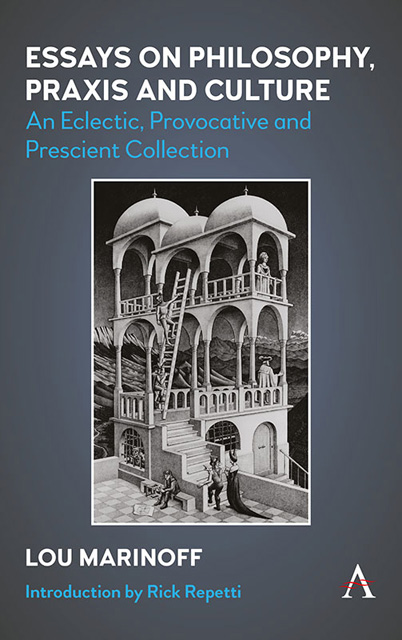Essay #1 - On the Emergence of Ethical Counseling: Considerations and Two Case Studies
Published online by Cambridge University Press: 10 January 2023
Summary
Following the First International Conference on Philosophical Practice, co-organized by Ran Lahav and Lou Marinoff, held at the University of British Columbia in July 1994, a seminal anthology was published in which this essay first appeared: Lou Marinoff, “On the Emergence of Ethical Counseling,” in Essays on Philosophical Counseling, edited by Ran Lahav and Maria Tillmanns (Lanham, MD: University Press of America, 1995), 171–91.
The essay is republished here by permission of Rowman & Littlefield, 4501 Forbes Blvd., Suite 200, Lanham, MD 20706. All rights reserved.
The emergence of professional ethical counseling was neither planned nor foreseen by the Centre for Applied Ethics, a research unit in the Faculty of Graduate Studies at the University of British Columbia. Affiliates of the Centre are philosophers, whose collective expertise spans ethical theory, applied ethics, and synthetic ethics (e.g., computer modeling). A growing public appetite for professional ethical pronouncements on topics of widespread concern and persistent newsworthiness, in areas such as biomedical ethics, business ethics, and environmental ethics, has resulted in considerable media exposure of the Centre. As the general public began to hear about the Centre through one medium or another, distressed individuals came to seek ethical counseling from it, either by telephone consultation or by personal interview. This emergent demand has necessitated the (ongoing) development of basic protocols, or guidelines, for the theoretical and practical philosopher handling such requests.
Historical Considerations
To begin with, the diversity of the requests themselves show that there is a broad spectrum of public need which is not only not being met but which is also in some respects being exacerbated by established institutions that dispense various forms of counseling. The decline of organized religion and family medicine have obviated, respectively, dogmatized moral instruction and informal practical guidance. Moreover, recent scandals involving supposedly irreproachable clergy and medical practitioners have abetted the erosion of trust in the institutions to which they belong. And while social workers, psychologists, psychiatrists, lawyers—and, for that matter, bartenders—are trained to render specialized professional services, their training normally encompasses neither the formal study of belief systems in general nor ethical matters in particular.
- Type
- Chapter
- Information
- Essays on Philosophy, Praxis and CultureAn Eclectic, Provocative and Prescient Collection, pp. 21 - 38Publisher: Anthem PressPrint publication year: 2022



